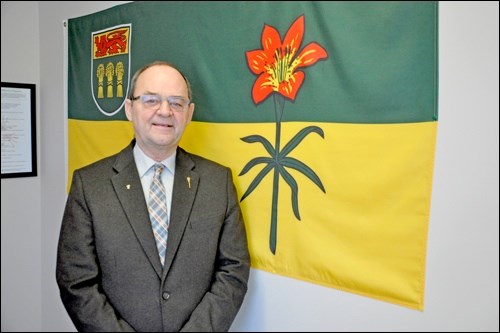With the spring legislative session now in the books, Battlefords MLA Herb Cox has returned home to meet and hear from constituents.
Since the legislature wrapped up on May 16, Cox has already received plenty of feedback. As he tells it, their main concerns aren’t so much provincial, but federal.
“Most of the comments or questions I get are with regard to the federal government,” said Cox.
“The comments I get are basically ‘are we going to we win our case on the carbon tax?’ [and] ‘can we win the fight against C-69 and C-48?’”
He noted people are still concerned about jobs, and about the trade war with China on canola.
“If our farmers are hurting, that hurts the whole economy in this province,” said Cox. He noted Premier Scott Moe and the agriculture minister, David Marit, are working hard “to try and assist the federal government to get that resolved.”
The carbon tax and pipeline concerns were big ones for the provincial government during the session that just wrapped up.
“Premier [Scott] Moe has been very vocal on his opposition to [the carbon tax] as well as C-69 and C-48 on the federal level.”
The federal election is due to take place Oct. 21. Cox acknowledges that will be the main focus of people around the province.
“The upcoming months is basically going to be about the federal campaign and what’s going to happen nationally, and what can be done to resolve the international problems we are facing.”
The legislative session that wrapped up was heated at times, with Speaker Mark Docherty often having to stand to warn people to tone it down.
Cox was of the view, though, that the tenor wasn’t all that much worse than any other session.
“We take our jobs seriously and if we didn’t we wouldn’t be there, and of course we have differences of opinion,” he said.
“Sometimes maybe things are said in the heat of debate that they would regret later.”
It had been a busy session from a legislative standpoint.
“I think there were something like 40 pieces of legislation we dealt with,” said Cox.
Of those, Cox could point to several highlights.
One of the highlights was the change to allow rural municipalities and municipalities under 500 population to combine into regional police services.
“For some reason that wasn’t allowed before,” said Cox. That change was something that came out of the recommendations from the Caucus Committee on Crime which Cox chaired.
Another change was to allow volunteers, firefighters and first responders who spend 200 hours or more of eligible service to claim an income tax credit.
The election dates legislation was also changed; the province election date is set for Oct. 26, 2020 and the municipal election will be Nov. 9. There will always be a two-week space between elections in subsequent years, Cox said.
Clare’s Law has also been brought in this session; that allows individuals to go to the police and get information about their partners’ previous abusive behaviour.
The government also introduced five days of paid leave for interpersonal violence and five days of unpaid leave for those suffering from sexual violence.
“We realize those are very trying times for people,” Cox said.
Also brought in was the new trespass act, where people require permission to cross private property. “We were the last province to pass the Trespass Act and now we’ve done that. People wanting to cross land need permission to do it. I think that’s probably the right way to go.”
One obvious highlight of the past session that Cox had pointed to before was the opening of the new Saskatchewan Hospital and integrated correctional facility.
But the euphoria over that grand opening has since dissipated with recent news that the entire roof of the Saskatchewan Hospital has to be replaced due to a manufacturing defect. The opposition NDP has since called for a full facility audit.
For his part Cox expressed concerns about the disruption at the facility.
“It’s an unfortunate thing,” said Cox. “There’s going to be a little bit of disruption out there, and that’s the sad part.”
Cox did point out it would be the P3, not taxpayers, who would be on the hook.
“This is not going to cost us or the taxpayer any more money,” said Cox. “The (Access) Prairies Partnership is responsible for replacing that and bringing it up to perfect standards after that.”




